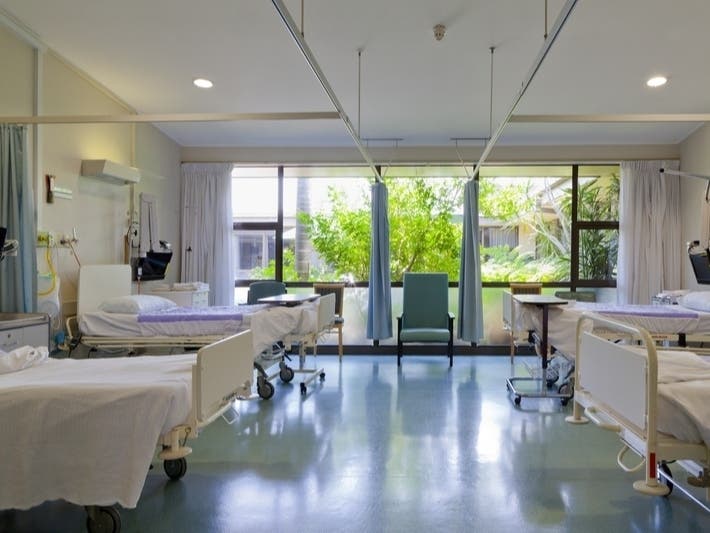Health & Fitness
NJ COVID Hospitalizations Highest Ever Since May 2020
"The number of cases we're seeing today blow anything we've seen since the start of the pandemic out of the water," Gov. Murphy said Monday.

NEW JERSEY — Since the onset of the coronavirus pandemic, Gov. Phil Murphy has spoken about the need to keep New Jersey’s hospitals from becoming overrun, but that may soon be the reality with the recent surge in cases brought on by the omicron variant.
On Jan. 1, New Jersey saw 29,740 new COVID-19 cases, its highest number of new cases since the pandemic began. On Jan. 2, there were 4,715 hospitalizations due to COVID-19, the most since early May 2020.
Over the last week, the number of people who have been hospitalized with the coronavirus has increased more than 50 percent, state officials said during a news conference on Monday.
Find out what's happening in Cinnaminsonwith free, real-time updates from Patch.
“The number of cases we’re seeing today blow anything we’ve seen since the start of the pandemic out of the water,” Gov. Phil Murphy said. “Ensuring the ability of our healthcare system to serve those who are the sickest is among our very highest priorities. The last thing we can allow is for our hospitals to be overrun.”
As of Tuesday morning, North Jersey hospitals had the highest number of hospitalizations, with more than 2,400 people, including 133 on ventilators. A total of 335 patients statewide were on ventilators.
Find out what's happening in Cinnaminsonwith free, real-time updates from Patch.
In the southern portion of the state, hospital census is higher than it was during the peak of the pandemic in April 2020, according to New Jersey Health Commissioner Judith Persichilli.
On Tuesday morning, Jefferson Hospital in Washington Township, Gloucester County, was already on divert status, while three others had reached full capacity.
While less severe than other strains, the omicron variant is far more transmissible, leading to the vast increase in cases and hospitalizations.
And the true number of new cases isn’t exactly known because many people who take at-home tests aren’t reporting their results to local health departments, Murphy said.
“Illnesses due to omicron don’t lead to hospitalization at the rate we have seen with prior variants, but when we are seeing case counts as high as we are and knowing the real number is much higher, whatever solace we get from a lower hospitalization rate goes out the window,” Murphy said. “The sheer number of new cases are directly leading to hospitalization figures we have not seen in well over a year.”
The cases and hospitalizations are being exacerbated by staffing shortages at hospitals and long-term care facilities due to fatigue and illness, Persichilli said. As a result, the state has turned to FEMA and the National Guard for help staffing hospitals.
The state requested 10 strike teams of 15 members each and is awaiting approval, according to New Jersey State Police Superintendent Col. Patrick Callahan.
“We can set up all the beds we want, but if we don’t have the medical staff to go out there and take care of patients, it’s really going to be all for naught,” Callahan said. “It’s our primary concern.”
Murphy pointed out that there were volunteers from elsewhere in the country and the world that came to New Jersey to help with hospital staffing shortages at the onset of the pandemic, but that won’t be the case again.
There also won’t be off-campus medical sites like the ones that were set up early in the pandemic because those actually put a strain on medical workers, Persichilli said.
“We will keep the staff close to the hospitals by adding capacity in and around our existing hospital campuses,” Persichilli said.
Hospitals and long-term care facilities also have plans in place to compensate for 30 percent of their staff being sick at any given time.
“We’re all getting clobbered,” Murphy said. “The model for this year is going to be on campus, trying to find a way to get another 50 or 100 beds into an existing campus or set a tent up on campus.”
While Murphy said the state won’t put a ban on elective surgeries, hospitals are canceling procedures on their own. Surgeries are separated into five categories based on severity and need, and many hospitals have begun postponing surgeries on the lower end of that scale, Persichilli said.
Persichilli said people are going to emergency rooms to get tested because of the scarcity of available testing. The state’s at-home testing partner, Vault, has put a limit on the number of at-home test kits they are sending out, but Persichilli urged residents not to visit hospitals simply to get tested.
“Emergency departments are experiencing high volumes of individuals seeking non-emergency COVID-19 testing,” Persichilli said. “The emergency rooms are not COVID testing sites.”
Anyone who can’t order a test kit because of the cap or can’t find an appointment to get tested is urged to keep trying, Persichilli said. More information about testing is available at covid19.nj.gov.
Get more local news delivered straight to your inbox. Sign up for free Patch newsletters and alerts.